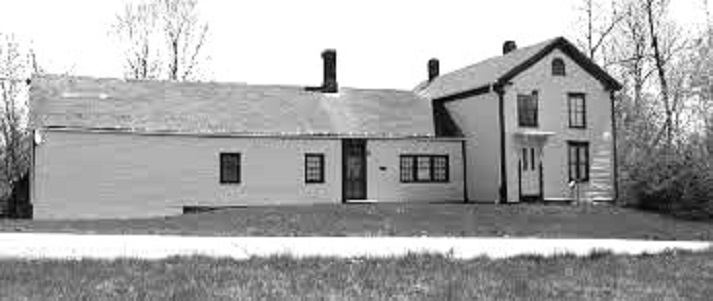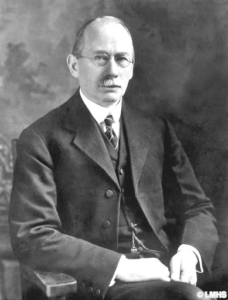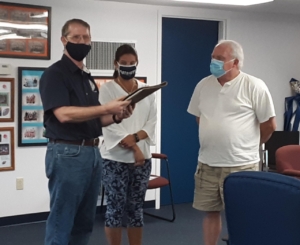
China town manager Rebecca Hapgood. (photo by Eric W. Austin)
As China’s new town manager, Becky Hapgood is taking over the position at one of the most challenging times in the town’s history. With big projects on the horizon, like the Causeway Phase 2 construction planned for later this summer, and the COVID-19 pandemic making all aspects of life more complicated, Hapgood is facing a host of responsibilities right out of the gate not usually associated with being a small-town manager.
Thankfully, Hapgood has a number of factors in her favor. She’s worked at the China town office for nearly three decades and was recognized for 25 years of service in a ceremony last year. During that time, she has served under three town managers in China and watched at least that many come and go in nearby towns. This experience has given her a perspective on the job not possessed by most who take up the position. I asked her what she has learned.
“Always be open and transparent,” she says. “Have conversations. Listen to what people say. Those are my big things. Transparency is key. Having communications — not only with the townspeople, but with the employees, because the employees are what back you up. They are your support system.”
Luckily, she’s feeling pretty good about her team at the town office. “I love our people,” she gushes enthusiastically. “We have some very top-notch people.”
It helps that she already thinks of the town of China as home. Growing up here, her parents opened and operated the Back’s Dairy Bar, in South China, for many years. After high school, she attended Thomas College, in Waterville, and graduated with a degree in business management. With this experience and education, one thing she understands is the importance of supporting local businesses.
“My father always used to drive home that it was sometimes difficult to do business in China,” she recalls. “It was something that I always remember as a kid growing up. When you have a business, there are always hurdles, but to have somebody work in conjunction with you … or just help you to access things you need to start up a business or to help your business grow [is an important part of the town manager job].”
The COVID-19 pandemic has also created new difficulties not encountered by most of her predecessors. The risks posed by the virus have turned mundane activities and services offered by the town office into new and unique challenges.
It doesn’t help that the town office is busier than ever, partially because one staff person is currently out on leave, which has left the office shorthanded, but also because the demands on the town office staff have increased in the two and a half decades Hapgood has been there.
“The community is far busier,” she says. “We just can’t keep up. We can barely do our day-to-day stuff. We’ve got an election coming up in July and there’s no time to breathe! [With] the election, and Dennis [Heath, current town manager,] getting done, we’re just keeping our heads above water.”
And in the current health crisis, the recent election presented a special challenge. Since the annual business meeting was canceled because of the pandemic, all of the items normally decided at the meeting were on the written ballot instead.
“[We’re] trying to figure out how to get a mass amount of people into a voting booth when we now have a written ballot that is four pages — and that’s just the municipal ballot,” she says.
The pandemic creates other, unique challenges for town offices holding elections. Officials handing out ballots will need to stand behind Plexiglass shields, and volunteers manning the voting machines need to maintain a safe distance at all times. Residents waiting to vote will need to be kept out of the sun while still observing proper social distancing. All of this adds additional complications to an already hectic day.
Things weren’t exactly easy even before the current crisis. “The amount of time needed to invest in what we do to prepare for an election is so much more than it was even ten years ago,” says Hapgood.
One of the other trends that Hapgood has observed over the last several decades is a drop in local community involvement. Volunteers are harder to find than they used to be. Town committees are sometimes sparsely populated and filling vacancies is more difficult. Hapgood has been in a unique place to observe this alarming trend, in her position as town clerk, as a volunteer coach for China youth athletics, and as one of the founders of the China Community Days event, which was skipped this summer for the first time in 17 years.
“We’re finding out more now that people aren’t necessarily into volunteering and participating,” she says. “We used to see a lot of volunteers, whether it be for athletics or things here [at the town office]. Our volunteer numbers are dwindling. People have other focuses in their lives.”
And that was before the current complications resulting from the COVID-19 pandemic.
“Just as a coach in youth [athletics] over the years…the numbers have decreased steadily. That’s why, back in the day, we started China Community Days,” she explains, “because we could see that [civic engagement] was slipping, and this gave us an avenue to bring everybody together.” Even that effort is struggling though. “It’s evident within the China Community Days volunteers,” she admits with a sigh.
More than anything, Hapgood would like to see that trend reverse. “I am all about the community,” she says. “This is where I grew up…and [I’m] very invested in the community. I like to see where the kids go off to school and see them return [and] watch their kids grow up…and welcoming people back to town when they move back. Those are the important things. Those are the connections we need here — we need more of them!”
After her many years dedicated to the town of China, it’s no surprise that Hapgood is taking over the town manager position with a great deal of community support. In my research for this article, I invited local residents to leave comments on Facebook about their interactions with Becky over the years. Here are a few of the things they shared. (The following comments have been lightly edited for spelling errors and readability.)
“Becky Hapgood always has a ‘positive can-do and super helpful’ manner in approaching any question I have ever posed to her at the town office,” says Christine Castner, a South China resident who grew up in China Village. “That attitude has been the over-riding impression I have had with any interaction with Becky.”
“Hunted and vacationed in China for years,” comments Paul Lucas. “When the opportunity came in 2006, we bought a home and moved to China. On our first visit to the China town office, Becky introduced herself and helped us by explaining what we needed to do to register vehicles, where to vote, about the Homestead Act, and directions to the Registry of Motor Vehicles for driver’s licenses. When my wife, Jane, and I left the town office that day, we knew we had made the right decision moving to China. Becky is always polite, professional and helpful. She will always take a moment to smile and say hello. A wonderful choice for town manager. Congratulations.”
Wendy Paine says, “Becky has always taken calls, texts, and private messages on weekends and after hours. She totally didn’t need to do this but always has! And [she has] always encouraged people to reach out to her anytime!”
For Becky Hapgood, the town of China is her life and she’s always on duty. “If we’re in Hannaford, people stop me all the time and ask questions — and it’s no big deal!” she insists. “Whether it’s ten o’clock at night or eight o’clock in the morning, that’s what I’m here for.”
The lengths she will go to seem, in fact, to have no bounds. Bunny Caldwell told me, “Becky has always been great to do business with. She helped us register our Maine dogs from Florida, and one year even chipped in a couple of bucks of her own that we owed in our taxes. We paid her back as soon as we got home. She always is friendly and has a big smile for everyone.”
Resident Kim Leighton Matthews expressed similar sentiments: “She has always gone [above and] beyond to help solve any problems we may have had with voter registration, a work permit for [our] teenage daughter, registering our dog, etc…” she says in a comment. “It has always felt less like dealing with bureaucracy and more like neighbor helping neighbor with Becky.”
Another resident, Michelle Bourque, saw Matthews’ comment and agreed wholeheartedly: “You nailed it: ‘More like neighbor helping neighbor with Becky.’”
Jeanne Marquis, who lives in China Village and serves as volunteer coordinator for the China for a Lifetime Committee, a local group that supports community activism, confirms Hapgood’s commitment to helping others. “Becky has connected local residents who need a little help to the China for a Lifetime Committee,” she says. “It is always in confidence so I can’t tell you the details, just that the individuals are very appreciative. She has a big heart!”
Another resident, Terrie Farris, remembers her time in China youth athletics under Coach Hapgood. “Becky was my J.V. basketball coach at China schools,” she recalls, “and she is someone I will never forget. She was always patient, supportive, understanding, caring and compassionate. She put her all into helping us become better players. She was always upbeat, positive — a can-do attitude with so much love in her heart to share with us all. I think it’s important for a coach to be able to connect with her players on a personal level and she was always tuned into us all as individuals. Becky is someone I’ve never forgotten or lost touch with as I’ve grown into an adult and a mother. She is just fabulous and I love seeing her expand on her career path.”
According to longtime resident Martha Wentworth, the new town manager also has a mischievous sense of humor. “Becky is a great prankster,” she says. “That has got to make your article. I have a story for you if you need one, but I’m only one in a pool of many China residents that have been schooled by this fine lady. I have yet to get her back.” Let’s just say, one of the stories involves wanted posters plastered all over a parking lot and another involves cars filled with packing peanuts!
Angela Nelson, who has worked for municipalities in Palermo and Sidney, and is now taking over the town clerk position in China, remembers leaning on Hapgood’s experience over the years. “When I first started in the municipality world in March of 2012,” she says, “Becky was the friendly voice on the other end of the phone, eager to help in any way she can. She even stopped by my office to help me with my first ever accounts payable warrant. Now, here we are eight years later and I have the privilege to work with her every day! Her vast knowledge of China and municipal government is irreplaceable. Congratulations, Becky.”
Michelle Laweryson Presby seems to summarize the broad community feelings about Becky Hapgood when she commented: “Becky was always a talented and much-appreciated high school sport photographer – not only for her athletes, but for the entire team. Becky always goes above and beyond in everything she does personally and professionally!”
As you have probably concluded already if you’ve read this far, Becky is facing a tough time ahead as China’s new town manager, with big projects on the horizon, an uncertain future with COVID-19, and a trending lack of civic engagement that is impacting many small towns in Maine and around the country – but she’s also taking on the position with an overwhelming and unprecedented level of local community support.
Contact the author at ericwaustin@gmail.com.












